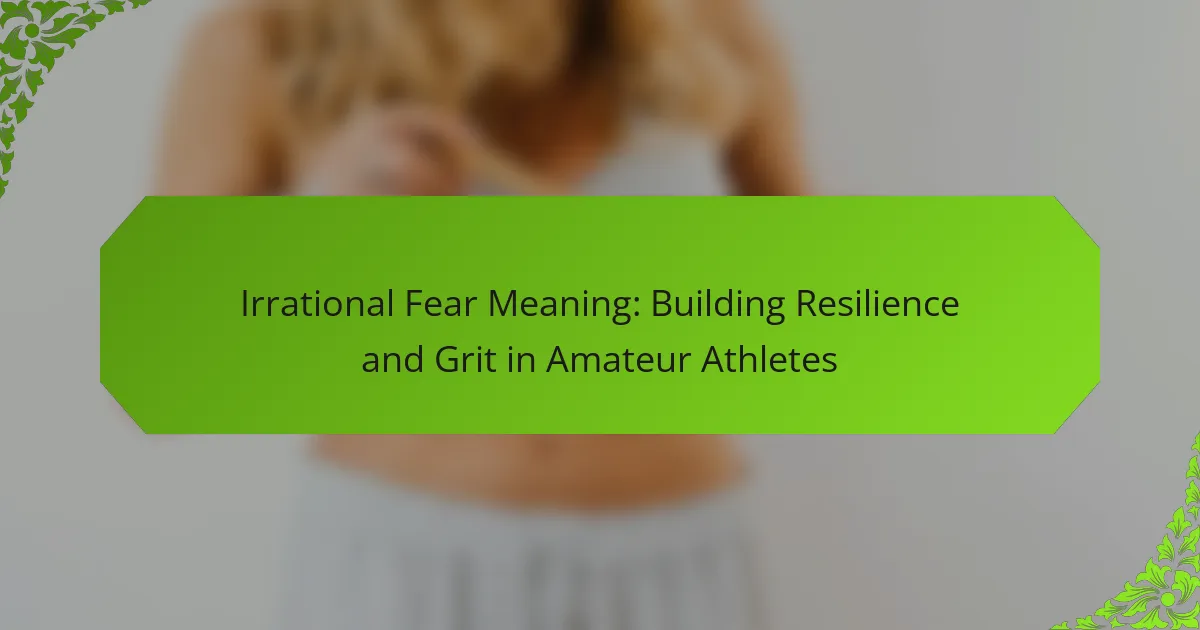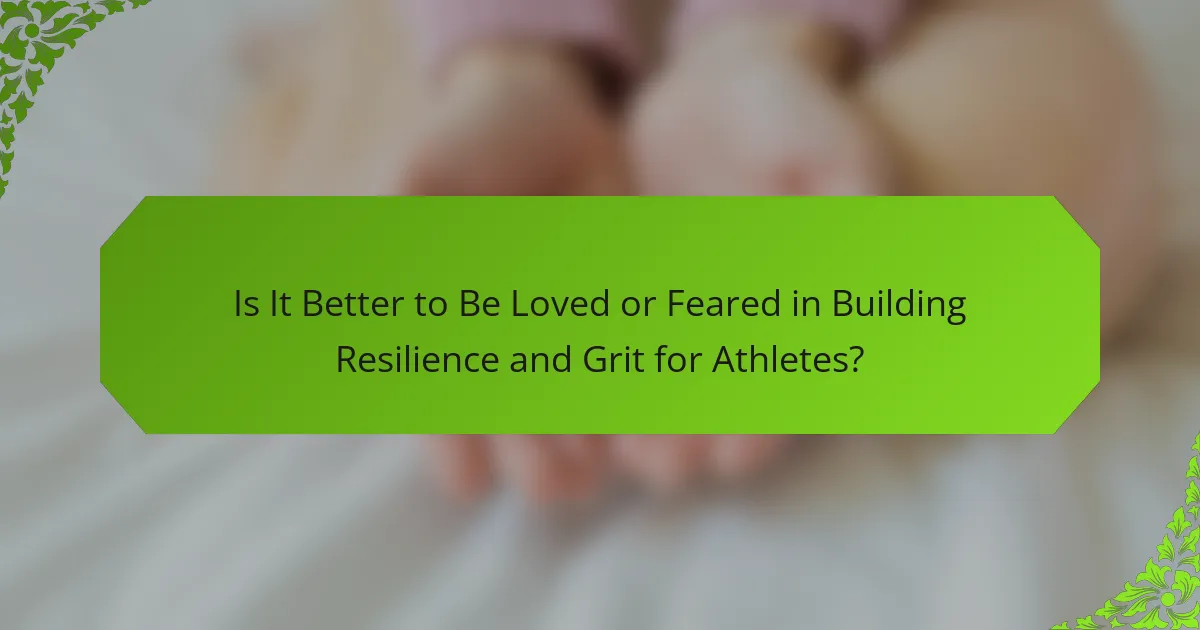Resilience and grit are crucial for amateur athletes striving to overcome challenges and enhance performance. This guide explores strategies for building resilience, such as setting SMART goals and embracing a growth mindset. It also discusses the importance of mental strength and support networks in fostering perseverance. Lastly, it highlights practices for measuring progress and sustaining these essential traits.

What is Resilience and Grit for Amateur Athletes?
Resilience and grit are essential traits for amateur athletes, enabling them to overcome challenges and maintain focus. Resilience allows athletes to bounce back from setbacks, while grit fosters perseverance in pursuing long-term goals. Together, these attributes enhance performance and mental toughness, essential for success in sports. Developing resilience involves embracing challenges and learning from failures. Cultivating grit requires consistent effort and passion for the sport, ultimately leading to personal growth and improved athletic performance.
How do Resilience and Grit differ in athletic contexts?
Resilience and grit are distinct but complementary traits in athletic contexts. Resilience focuses on the ability to recover from setbacks, while grit emphasizes sustained effort and passion over time. Athletes demonstrating resilience bounce back from failures, adapting their strategies. In contrast, those with grit persist through challenges, maintaining long-term commitment to their goals. Both traits enhance performance, but resilience addresses immediate obstacles, whereas grit fosters enduring dedication. Understanding this difference can help amateur athletes cultivate both qualities for improved outcomes in their sports journey.
Why are Resilience and Grit essential for amateur athletes?
Resilience and grit are essential for amateur athletes as they foster perseverance in the face of challenges. These qualities help athletes overcome setbacks and maintain motivation during rigorous training. Resilience allows them to bounce back from failures, while grit drives long-term commitment to their goals. Together, they enhance performance and promote personal growth, creating a strong foundation for success in sports.
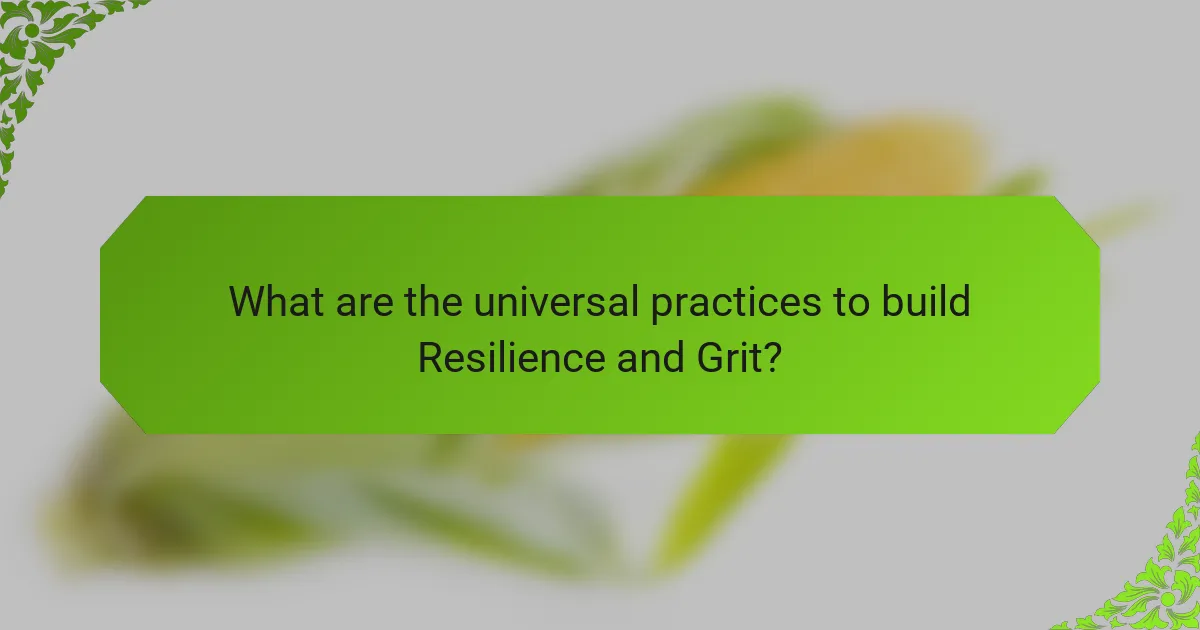
What are the universal practices to build Resilience and Grit?
Building resilience and grit involves consistent practices that enhance mental strength. Key strategies include setting clear goals, embracing challenges, and maintaining a positive mindset.
Regularly reflecting on experiences fosters self-awareness, while developing a support network provides encouragement. Engaging in physical activity enhances both resilience and grit, as it builds discipline and perseverance.
Adopting a growth mindset allows athletes to view failures as opportunities for learning. Lastly, practicing mindfulness techniques can help manage stress and improve focus, essential for overcoming obstacles.
How can goal-setting enhance Resilience and Grit?
Goal-setting enhances resilience and grit by providing clear objectives and motivation. Setting specific, measurable goals helps athletes focus their efforts and track progress. This structured approach fosters a sense of achievement, boosting confidence and perseverance. As a result, athletes develop the ability to overcome obstacles and maintain commitment during challenging times.
What are SMART goals?
SMART goals are specific, measurable, achievable, relevant, and time-bound objectives that help amateur athletes focus their efforts. They provide a clear framework for setting and reaching personal milestones. For example, instead of saying “I want to improve,” a SMART goal would be “I will run 5 kilometers in under 30 minutes within three months.” This clarity enhances motivation and accountability, fostering resilience and grit in pursuit of athletic success.
What role does positive self-talk play?
Positive self-talk enhances resilience and grit in amateur athletes by fostering a growth mindset. It reinforces belief in one’s abilities, which can improve performance under pressure. This mental strategy helps athletes overcome challenges and maintain motivation, ultimately leading to better outcomes in their sports journey. Regular practice of positive self-talk can significantly impact emotional regulation and self-confidence, crucial attributes for success in athletics.
How can visualization techniques improve performance?
Visualization techniques can significantly enhance performance by improving focus and motivation. These techniques help athletes mentally rehearse their skills, leading to increased confidence and reduced anxiety. Research indicates that mental imagery can activate similar brain regions as actual physical practice, boosting overall performance. Regular use of visualization can cultivate resilience and grit, essential traits for amateur athletes striving to overcome challenges.

What unique strategies can amateur athletes employ?
Amateur athletes can employ unique strategies like setting specific goals, embracing a growth mindset, and focusing on mental resilience. These approaches cultivate perseverance and adaptability, essential for overcoming challenges.
1. Set SMART goals (Specific, Measurable, Achievable, Relevant, Time-bound) to track progress effectively.
2. Adopt a growth mindset by viewing failures as opportunities for learning and improvement.
3. Practice mindfulness techniques to enhance focus and reduce performance anxiety.
4. Engage in community support by connecting with fellow athletes for motivation and accountability.
How does embracing failure contribute to growth?
Embracing failure fosters resilience and grit, essential for growth in amateur athletes. Failure teaches valuable lessons, builds mental toughness, and encourages a growth mindset. Each setback provides insights that refine skills and strategies, ultimately enhancing performance. As a result, athletes develop a stronger sense of self and greater determination to succeed.
What is the significance of a support network?
A support network is crucial for building resilience and grit in amateur athletes. It provides emotional encouragement, practical advice, and accountability. Engaging with a support network fosters a sense of belonging, which enhances motivation and perseverance. This connection can lead to improved performance and mental well-being, as athletes navigate challenges together.
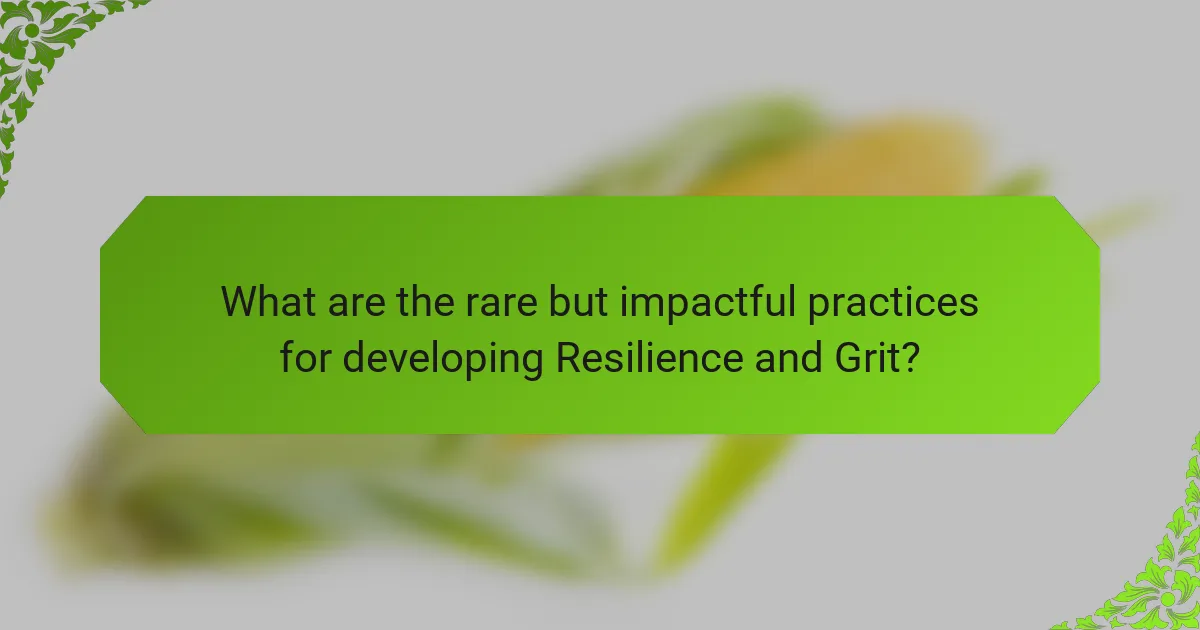
What are the rare but impactful practices for developing Resilience and Grit?
Practices for developing resilience and grit include embracing discomfort, setting incremental challenges, and fostering a growth mindset. These rare practices significantly enhance mental toughness. Embracing discomfort involves intentionally facing fears or challenges, which builds confidence over time. Setting incremental challenges allows athletes to experience small successes, reinforcing their resilience. Fostering a growth mindset encourages individuals to view setbacks as opportunities for learning, ultimately strengthening their grit.
How can journaling facilitate self-discovery?
Journaling facilitates self-discovery by providing a structured outlet for reflection and personal insight. It encourages athletes to process experiences, emotions, and challenges, fostering resilience and grit. Regular writing helps identify patterns in thoughts and behaviors, leading to greater self-awareness and clarity in goals. This practice can enhance mental strength, enabling athletes to navigate obstacles more effectively. By documenting their journey, individuals can track progress, celebrate achievements, and learn from setbacks, ultimately cultivating a deeper understanding of themselves.
What are the benefits of mentorship in sports?
Mentorship in sports enhances performance, builds resilience, and fosters personal growth. Mentors provide guidance, support, and accountability, helping athletes navigate challenges. This relationship cultivates mental toughness, crucial for overcoming setbacks. As a result, amateur athletes gain confidence, develop skills, and learn valuable life lessons, ultimately improving their overall experience in sports.
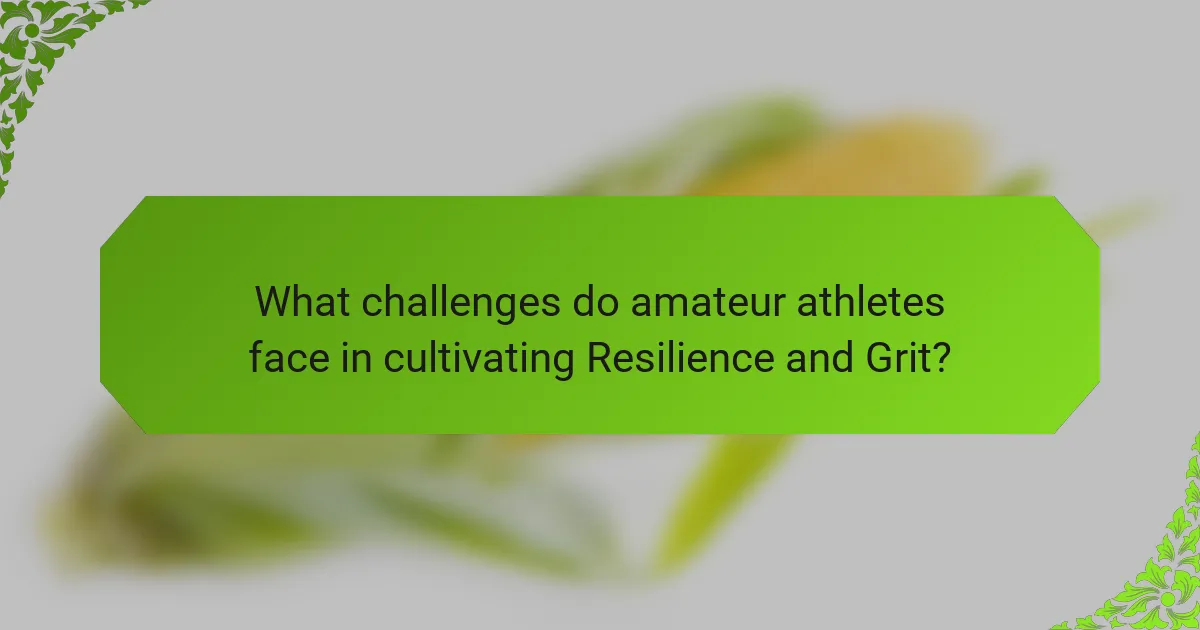
What challenges do amateur athletes face in cultivating Resilience and Grit?
Amateur athletes face several challenges in cultivating resilience and grit, including mental fatigue, lack of resources, and limited support systems. Mental fatigue can hinder motivation and focus, impacting performance. Limited access to coaching and training facilities restricts skill development. Additionally, the absence of a strong support network can lead to feelings of isolation, making it difficult to overcome setbacks. These factors collectively impede the growth of resilience and grit essential for success in sports.
How can athletes overcome mental barriers?
Athletes can overcome mental barriers by developing resilience and grit. Techniques include setting realistic goals, practicing mindfulness, and seeking support from coaches and peers. These strategies help build mental strength and enhance performance. Regularly reflecting on achievements fosters a positive mindset, essential for overcoming challenges.
What external factors can hinder Resilience and Grit?
External factors that can hinder resilience and grit include negative social influences, lack of support systems, and environmental stressors. These elements can undermine an athlete’s mental fortitude and motivation. For example, a discouraging coach or unsupportive peers can diminish self-confidence. Additionally, high-stress environments, such as intense competition or personal issues, can lead to burnout, impacting performance and perseverance.
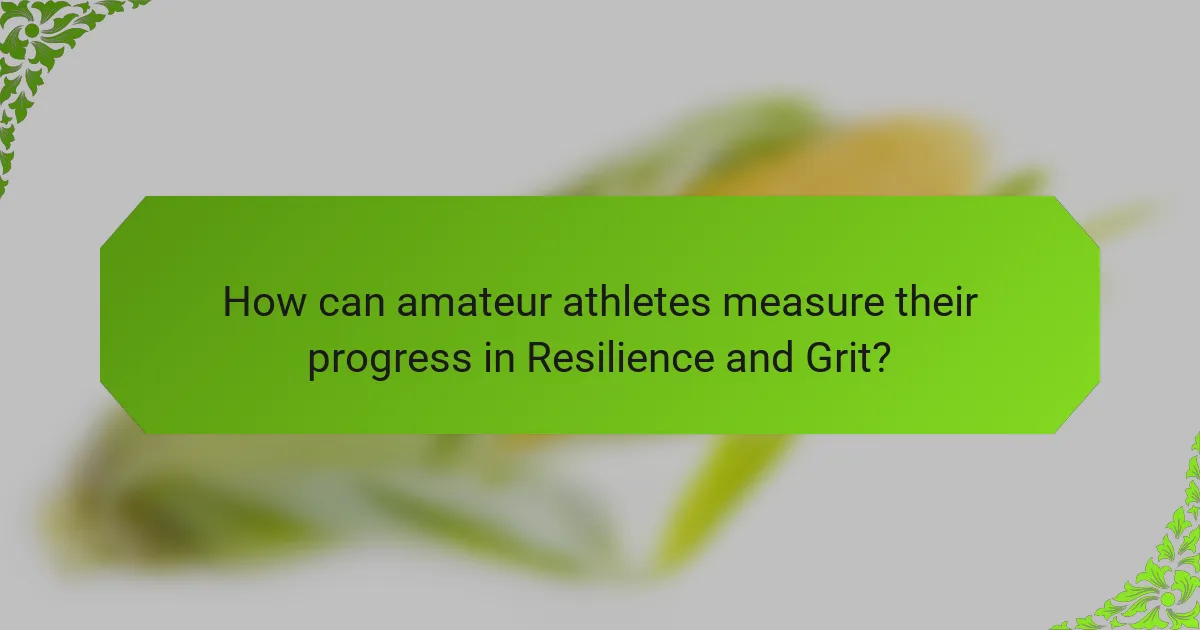
How can amateur athletes measure their progress in Resilience and Grit?
Amateur athletes can measure their progress in resilience and grit through self-assessment and performance metrics. Regularly tracking challenges faced, emotional responses, and recovery strategies helps gauge resilience. Setting specific goals and reflecting on setbacks enhances grit evaluation. Additionally, seeking feedback from coaches or peers provides external perspectives on growth.
What metrics can be used to assess growth?
To assess growth, amateur athletes can use metrics such as performance improvement, training consistency, and psychological resilience. These metrics provide insights into progress and areas for enhancement.
| Metric | Description |
|—————————-|————————————————-|
| Performance Improvement | Measure changes in speed, strength, or endurance. |
| Training Consistency | Track adherence to training schedules and routines. |
| Psychological Resilience | Evaluate mental toughness and ability to overcome setbacks. |
| Goal Achievement | Assess completion of set athletic goals. |
| Recovery Rate | Monitor time taken to recover from exertion. |
| Injury Frequency | Record occurrences of injuries during training or competition. |
How can feedback loops enhance learning?
Feedback loops enhance learning by providing continuous opportunities for improvement. They enable athletes to assess their performance, identify weaknesses, and adjust strategies accordingly. This iterative process fosters resilience and grit, essential traits for amateur athletes. Regular feedback helps in setting realistic goals, tracking progress, and maintaining motivation. As a result, athletes develop a deeper understanding of their capabilities and the necessary steps to achieve their objectives.
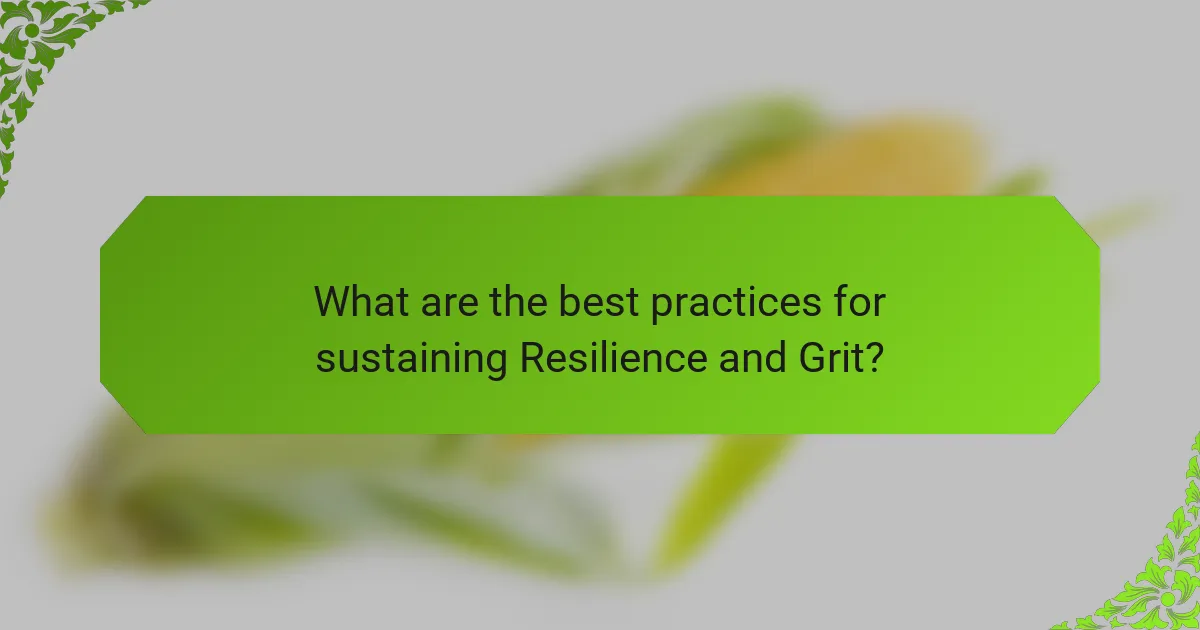
What are the best practices for sustaining Resilience and Grit?
To sustain resilience and grit, establish clear goals, maintain a positive mindset, and embrace challenges. Consistent practice, self-reflection, and seeking support from others enhance these qualities.
1. Set clear, achievable goals.
2. Cultivate a positive mindset through affirmations.
3. Embrace challenges as opportunities for growth.
4. Practice self-reflection to identify strengths and weaknesses.
5. Seek support from mentors or peers.
6. Maintain consistency in training and personal development.
How can athletes maintain motivation over time?
Athletes can maintain motivation over time by setting clear goals and developing a strong support system. Establishing short-term and long-term objectives creates a sense of purpose. Regularly tracking progress reinforces commitment. Engaging with coaches, teammates, and mentors provides encouragement and accountability. Incorporating variety in training keeps the experience fresh and enjoyable. Practicing mindfulness enhances mental resilience, allowing athletes to navigate challenges effectively.
What common mistakes should be avoided?
Amateur athletes should avoid common mistakes that hinder their progress. Failing to set realistic goals can lead to frustration and burnout. Neglecting recovery and rest periods often results in injuries and decreased performance. Ignoring nutrition and hydration affects energy levels and overall health. Lastly, comparing oneself to others can undermine confidence and motivation.
What expert insights can guide athletes on their journey?
Expert insights for athletes emphasize the importance of resilience and grit in achieving goals. Developing mental toughness enables athletes to overcome obstacles and maintain focus. Setting realistic expectations fosters a growth mindset, encouraging continuous improvement. Seeking mentorship provides valuable guidance, while embracing failure as a learning opportunity builds character. Prioritizing physical and mental well-being enhances performance and sustains motivation.
